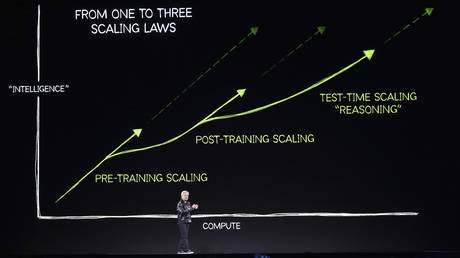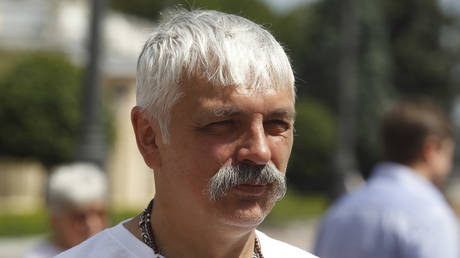A protester holds up a sign at a protest on Columbia’s campus. Demonstrators are demanding the school divest from Israel.
Alex Kent; Getty Images
Protests have rocked Columbia University’s campus.Demonstrators opposing the war in Gaza want the school to divest from Israel.In 1985, protesters had staged their divestment campaign — and it worked.
The unrest at Columbia University isn’t showing signs of slowing down.
Student protests are escalating there and other college campuses over the Israel-Gaza war and schools’ investments in Israeli entities, with demonstrators on Tuesday breaking into a Columbia campus building and occupying it.
It’s a shockingly familiar scene.
In the 1980s, student protesters at Columbia took over the same building and called for divestment of the Ivy League school’s investments over a different cause: South African apartheid.
But while that movement was a success, protesters today may find it harder to push the school into divesting.
Protests over Israel’s war in Gaza rage
Student demonstrators are calling for the Ivy League institution to divest from Israel and accuse the Jewish nation of killing civilians in Gaza.
The protesters are specifically demanding the school sell off investments not just from Israeli companies but from those that have ties to Israel, including engineering firms Lockheed Martin and Boeing and tech giants like Alphabet and Amazon, according to NPR.
Students have also called on the school to boycott Israeli universities and institutions, protect pro-Palestinian students and faculty, and make a statement condemning the war in Gaza.
The protesters swarmed the campus and set up tents. Meanwhile, Jewish leaders on campus say some students were targeted with offensive rhetoric as the demonstrations escalated.
The protests, which have lasted nearly two weeks, took another turn on Monday when the school announced it wouldn’t cut its investments from Israel and warned protesting students to leave or face suspension.
The deadline came and went, and hours later, demonstrators broke into Hamilton Hall on the campus and barricaded themselves inside early Tuesday morning.
A demonstrator used a hammer to break through a window in Hamilton Hall early Tuesday.
Alex Kent; Getty Images
A coalition group of dozens of organizations called Columbia University Apartheid Divest, which has helped organize the protests, said in a statement that students had renamed the building “Hind’s Hall” after a Palestinian girl who was killed in Gaza.
The controversial protest movement has drawn criticism and support from top political and financial figures. The White House said President Joe Biden supported the right to protest peacefully but condemned the takeover of Hamilton Hall.
“Forcibly taking over buildings is not peaceful — it is wrong,” a White House spokesperson said.
Meanwhile, House Speaker Mike Johnson and other Republicans have called for the school’s president to resign, alleging she’s failed to protect Jewish students on campus.
Student protesters at the 1985 demonstrations at Columbia University.
Barbara Alper; Getty Images
The 1985 protests
The demonstrations are reminiscent of those in 1985, when protesters and civil rights leaders were outraged over the apartheid regime in South Africa.
In 1978, the school’s governing body had recommended selectively selling stocks of companies that had holdings in South Africa, according to a New York Times article at the time. Three hundred students had protested outside the meeting, calling for all the stocks to be divested, the Times reported.
The school’s 1978 recommendation didn’t shut down the protests. In April 1985, the Coalition for a Free South Africa at the school organized a protest at Hamilton Hall, according to the Columbia Spectator.
The small demonstration quickly grew to thousands of supporters, the Spectator reported. Protesters there locked and chained the doors to Hamilton Hall — the same building now occupied by pro-Palestinian protesters — and demanded the school completely divest from South Africa.
The protests lasted on campus for 21 days before the students called the demonstrations off; the announcement came just minutes before a judge ordered the students to allow people access to Hamilton Hall, The New York Times reported.
Months later, Columbia’s trustees voted to divest from South Africa completely.
A more fraught situation
On its website, the Columbia University Apartheid Divest group likened itself to the protests from nearly 40 years ago.
“We are a continuation of the Vietnam anti-war movement and the movement to divest from apartheid South Africa,” the group wrote.
But despite the similarities between the movements’ tactics, the situation in 2024 may make it harder for demonstrators to achieve their goals.
In the 70s and 80s, Columbia’s leadership was sympathetic to the divestment cause; students were arguing that the school didn’t go far enough.
The pro-Palestinian demonstrators also face a more hostile geopolitical environment.
In the 1980s, apartheid was broadly condemned by the US, and in the months after the protest, President Ronald Reagan signed an executive order preventing loans and technology from being sent to South Africa.
The US relationship with Israel now is far more complicated. The conflict in Gaza was sparked by Hamas’ terror attacks in October 2023 that killed hundreds. Israeli authorities said Hamas fighters captured 253 people after the assault across the border.
As of now, 112 of the hostages were returned alive, but dozens are still suspected to be in captivity, Israeli officials say. The Israeli government responded to the attack with an assault on Gaza, which has killed more than 34,000 people, according to the Hamas-run health ministry.
Israel is an important ally of the US in the Middle East, and President Joe Biden has emphasized he’s a strong supporter of the Jewish state.
But Biden is facing pressure from progressive and young voters, who blame him for sending weaponry to Israel as the civilian death toll rises by the thousands in Gaza. Biden’s administration, in recent months, has pushed the Israeli government to allow more humanitarian aid into the region and take steps to avoid civilian casualties.
Israel’s leader, Benjamin Netanyahu, has so far largely brushed off Biden’s criticism and promised to launch an offensive into Rafah, a city in Gaza where over 1 million Palestinians are taking refuge. Netanyahu has vowed to destroy Hamas completely.
Meanwhile, cease-fire talks between Israel and Hamas have stalled.
So, too, has the prospect of divesting. Columbia president Nemat “Minouche” Shafik said school leaders and students weren’t able to negotiate an end to the protest and flatly shot down the immediate divestment demands.
“While the University will not divest from Israel, the University offered to develop an expedited timeline for review of new proposals from the students by the Advisory Committee for Socially Responsible Investing, the body that considers divestment matters,” Shafik wrote on Monday.
Even then, it’s unclear how effective divestment would be in changing the school’s finances. The Ivy’s massive $13.6 billion endowment would be challenging to sort through.
“The economy is so global now that even if a university decided that they were going to instruct their dominant management groups to divest from Israel, it would be almost impossible to disentangle,” Nicholas Dirks, former chancellor of the University of California, Berkeley, told CNN.
Divesting also means another investor would need to purchase those stocks, ultimately reallocating who supports the organizations in question.
But Christopher Marsicano, an assistant professor at North Carolina’s Davidson College, told Al Jazeera that divestment drives may be more effective in incentivizing political — not economic — change.
“Israeli Prime Minister Netanyahu has already mentioned student protests at American universities publicly,” Marsicano told the outlet. “It is clear that these protests have captured the attention of the Israeli government and are putting some pressure on stakeholders to support a cease-fire.”





+ There are no comments
Add yours